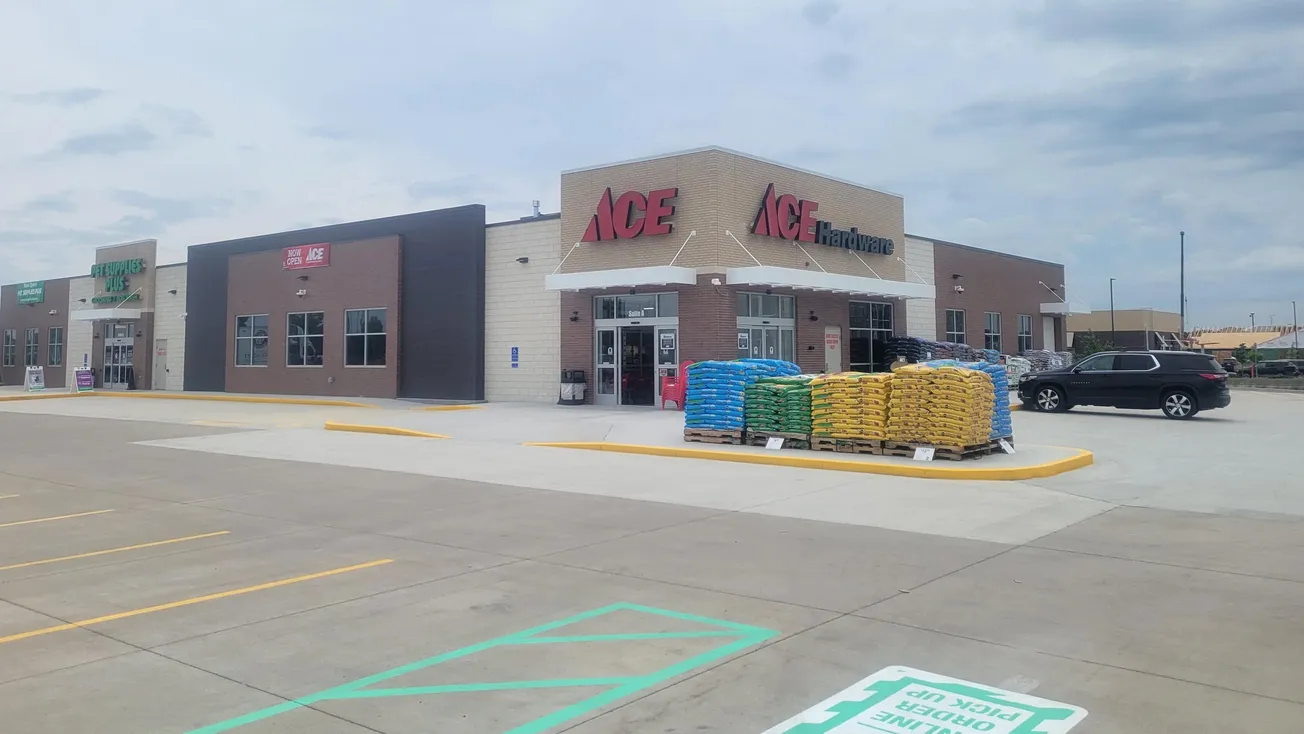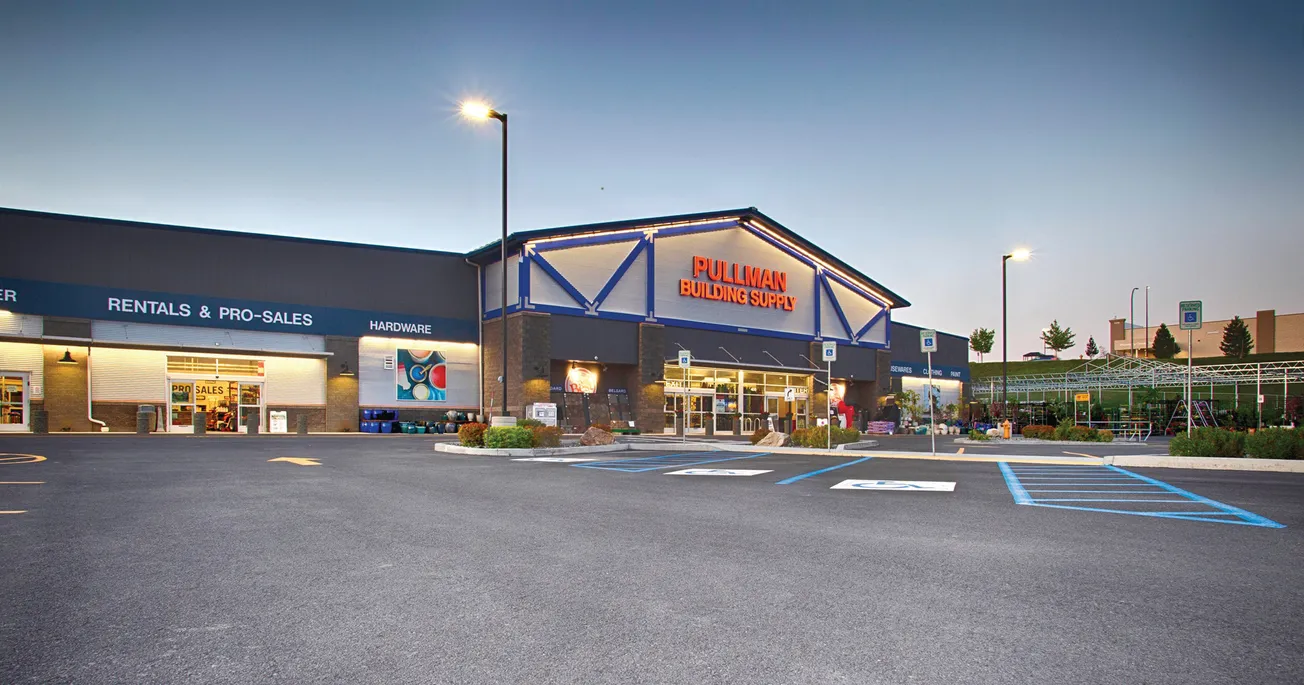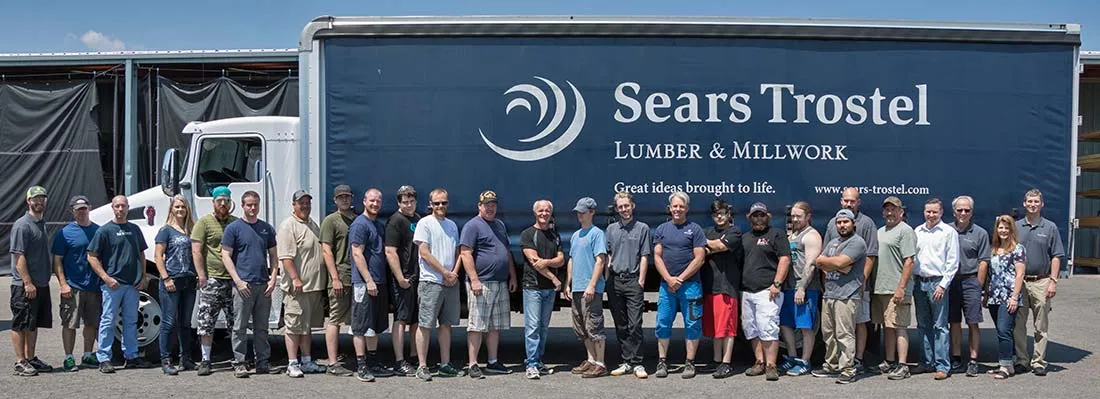Table of Contents
Archbold, a tiny town tucked into the northwest corner of Ohio, is reached by a trickle of asphalt off the grand Ohio Turnpike. Tiny, yes, but backwater? Oh, no. The town of 4,300, punching far about its weight in economic stats, boasts over 4,000 jobs. Hundreds of them sprout from titan industries like Sauder, the world’s largest manufacturer of ready-to-assemble furniture. Seventeen, from Lugbill.
Lugbill Supply Center’s niche, right from the outset in 1962, was furnishing and erecting pre-engineered buildings manufactured by Varco Pruden Buildings. It’s what brought Dave Nafziger to town—well, back to the town he’d said goodbye to after college—when he accepted the job as Lugbill’s president in 2002. “I owned a construction company in a western suburb of Chicago, where we also utilized VP pre-engineered buildings. Knowing that, the company’s board asked me to visit and consider working here (as my dad had for 40 years).”
Maybe it was the sweet, well-kept community. Maybe it was the family heritage. Or maybe they spiked his Kool-Aid. Whatever: One look and he and his wife, Deb, agreed. They sold the Illinois business in two weeks and their home in three days and headed over. (Today Deb is one of those 17 employees. And one of their sons is another.)
One of Dave’s first ventures was to launch a wholesale plumbing company and a commercial plumbing contracting company in tandem with the building supply operation. “I sold those in 2012 to our competitor as their fourteenth location. They were profitable, and we were able to sell at the right time, so we could focus on our core.”
That core was Varco. It freed him to multiply those ops. “We have one customer in town that has used us for more than 6 million sq. ft. of manufacturing and warehouse space. I’ve also put up buildings from Kalamazoo, Mi., to Clanton, Al. We’re currently working on a $3.5 million project for another customer. We do anything from a 60-by-90-ft. ag building to a 1.5 million-sq. ft. distribution center. We provide steel and do some construction management—that’s what brings me to the table—but I won’t compete and go heads against our own commercial customers.” The niche provides about a nice portion of the company’s income, “and it’s just me, supervising, and I can travel. It’s a nice profit center.”
Lugbills doesn’t neglect its local contractors, however. There’s plenty of TLC to go around. These pros constitute 70% of the operation’s accounts—pleased, Dave says, by the staff’s depth of product knowledge and pride in service. “Our pros tell me they could drive 25 miles to Lowe’s or Menards and find shingles, say, for $3 cheaper, but they realize that doesn’t make sense. Here, it’s all about relationships: We help them. We introduce them to new products and innovations. We host a contractors’ breakfast with our vendors and a contractors’ night with prizes. We deliver with a boom trick. We offer rebates for keeping their accounts current and send out checks. We also send checks at the end of the year if they’ve met their goals of annual buying. Plus, they’re all friends. It’s all about relationships,” he repeats with vigor. “When I came back here after 18 years, I saw some of the same contractors I’d known. Folks stay loyal. And we work hard for that: anything to keep them in front of us, and us in front of them.”
Lugbill also enjoys a strong agricultural market, especially in the post-frame construction business. And it heeds its walk-in trade, too—that important 30%, whether local handymen or the burgeoning female market, for which it’s recently added a new paint center and extended its home goods section. “Two ladies on staff, too,” Dave adds.
Speaking of staff: Among those 17, Dave just handed out two 40-year awards, one for 35 years, one for 15, and another for 10, explaining, “We have very little turnover.” A huge reason is how these folks are treated, which is what the boss defines as “servant leadership”—asking nothing of the staff he wouldn’t do, himself. “The Golden Rule applies all across the board. And we’re very family-friendly. If your kid’s got a softball game at 4:00, it’s ‘Go! Be with your family!’ They know they won’t get rich being in this industry, but we offer things that are more important.”
Dave hires for attitude, not aptitude. “Give me someone with a great outlook on life and the desire to be a servant leader, and I will take them over a grizzled industry veteran with a negative attitude.”
His 24-year-old son buys that. Utilizing his degree in PR and marketing, “he gets the whole technology thing,” says Dad. “He built our website and handles advertising and social media”—largely a robust Facebook presence, juiced to introduce new products and build Lugbill’s brand, and it’s paying off by attracting a new, younger market. “He’s doing all that stuff I hate,” shivers Dave, the president.
These days Dave the president is also Dave the owner. “I knew the partners were talking about selling the business—they’d sent the financials to a competitor in Indiana—or even shutting it down, and I just couldn’t stand the thought of the business not being here in Archbold any longer, let alone what would happen to our employees. So we prayed about pushing everything we owned into the center of the table and jumping all in.
“It was the right thing to do. It was a three-year process, and the local bank was willing to partner with us. As president, I had access to all the information. And Deb and I were newly empty-nesters (and loving it), with two boys either married or in college.”
But one big decision overtook another. Deb had made her first trip to Haiti at the same time. She came back, Dave reports “with the inkling that the Lord was asking us to adopt a brother and sister. God’s timing and sense of humor were evident as we closed on the financials of the business and brought the kids, then ages 13 and 8, home to us within about two weeks of each other. But,” he’s quick to add, “we have a ton of support from our employees and our church family,” where the couple had absorbed its message about caring for widows and children: “Crazy! Adopting kids when I was 50! But we were called to do that crazy thing.”
As Lugbill’s new owner, Dave knew that some changes would be required, “and change is difficult in this industry,” he understood. “I looked at co-ops, and joining one was the best decision I ever made. It changed the way we buy and do things. We got a lot better at merchandising. We use Margin Master, and we increase our margins one point a year by rounding up [the price tags] to our advantage, which customers don’t object to, but also doesn’t ruin your reputation for low prices, compared with the boxes. We also updated our computer system. Change,” he reiterates, “is necessary to remain viable. It’s hard, I know, for an employee to stand there in front of a customer and have to adapt to something new. But it’s vital.”
A customer survey prompted more tweaks. “The main thing we learned from the survey was that we were not so smart,” he laughs. “In fact, we’d outsmarted ourselves by using just-in-time purchasing.” The result was half-empty shelves, which left customers the impression that Lugbill was going out of business. “We have a 12,000-sq. ft. showroom, and now the message is ‘Fill those pegs!’”
More changes yet were prompted by the recent recession, during which “We paid some pretty high tuition—and I don’t want that to happen again. We’re doing a better job at preparing for those eventualities by keeping an eye on our staffing levels and expenses. We weren’t prepared for 2008. We were overstaffed. But we didn’t resort to layoffs. Now, through attrition, we’re leaner. We also learned to buy smarter—to negotiate better terms with our vendors. The formula now is pretty simple,” he says: “Sell more at better margins, and manage the cost structure.”
It’s paid off. “In the future, as we alleviate some of our debt service, here’s how we want to split those profits: a portion to employees, a portion rolled back into the business, and a portion to missions, the community, and the church. That’s what drove us to succeed and purchase the business in 2013,” Dave explains, “and why we get up and do what we do every day.”









